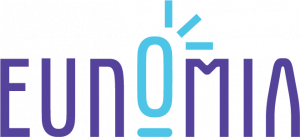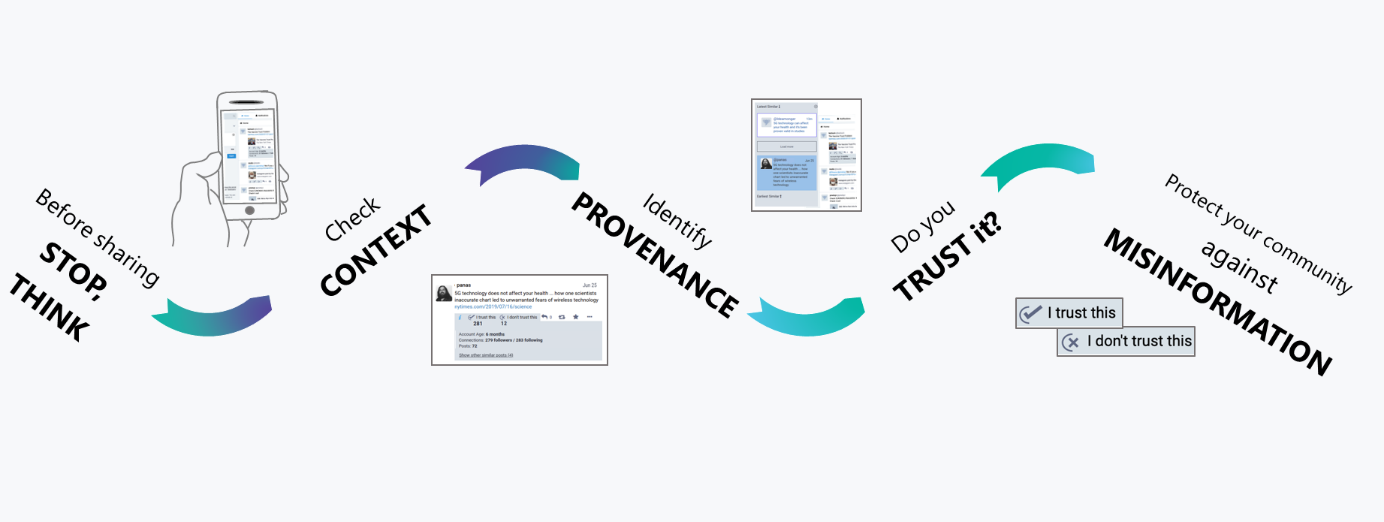 https://www.synyo.com/wp-content/uploads/SYNYO-NEWS-featured-image-Press-Release.png
400
459
leo
https://www.synyo.com/wp-content/uploads/2017/09/synyo-logo.png
leo2025-12-15 09:55:062025-12-18 09:55:28ReIncluGen: European Research Project Maps New Ways to Strengthen Support for Migrant Women
https://www.synyo.com/wp-content/uploads/SYNYO-NEWS-featured-image-Press-Release.png
400
459
leo
https://www.synyo.com/wp-content/uploads/2017/09/synyo-logo.png
leo2025-12-15 09:55:062025-12-18 09:55:28ReIncluGen: European Research Project Maps New Ways to Strengthen Support for Migrant WomenEUNOMIA

EUNOMIA: Project to empower social media users to identify trustworthy information ends
The three-year European-funded project EUNOMIA has created a prototype that allows social media users to assess the trustworthiness of information, thus protecting their community against misinformation.
Tackling the global challenge of online misinformation, the EU-funded H2020 project “EUNOMIA: User-oriented, secure, trustful & decentralised social media” set out to create a set of tools that allows social media users to identify trustworthy and untrustworthy information, empowering them to:
- identify the provenance of information;
- assess its trustworthiness; and
- protect their community against misinformation.
A consortium of ten partners from nine European countries have set out to elaborate a technical solution to address the socio-technical challenge of misinformation. Coordinated by the University of Greenwich, the project team includes the University of West Attica, the University of Nicosia, Inov, SIMAWI, Trilateral Research and SYNYO. Furthermore, the project involves Eugene Rochko (the founder of Mastodon), Österreichischer Rundfunk (the Austrian public broadcasting company), and Blasting News (the largest social journalism platform). Within this complementary team, SYNYO was responsible to analyse user behaviour in social media, and to evaluate the two pilot phases of the project.
The EUNOMIA prototype: a set of tools to identify trustworthy information
EUNOMIA is an open-source solution for organisations that would like to deploy their own social media environment with emphasis on trust instead of likes. The prototype consists of seven technical components, namely:
- Cybersecurity and Privacy Framework;
- Peer-to-Peer Infrastructure;
- Blockchain Infrastructure;
- Digital Companion;
- Human-as-Trust-Sensor (HaTS) and Information Cascade Mechanism;
- Content and Context Data Collection and Analysis;
- Trustworthiness Scoring.
Furthermore, two additional components are:
- Digital Observatory
- Face-swap feature
The components run locally but in a decentralized manner; that means, the EUNOMIA modules (or nodes) are not directly connected to a central server. Three of the components (cybersecurity and privacy framework, P2P infrastructure, blockchain infrastructure) provide a secure and decentralised infrastructure; the remaining tools run on top of this. The trustworthiness scoring system is a deep learning mechanism that is fed by the HaTS and information cascade mechanism, as well as the content and context data collection and analysis. These analyses are visualised in the Digital Companion. The Digital Observatory visualises the data analysed for the trustworthiness scoring system, while the face-swap feature is a ‘community building’ microservice that allows users to experiment with deep-fake in a playful way. An overview of the different tools and how they are implemented within the Mastodon social media platform are explained in this video.
Together, these tools allow the user to track the provenance of information and how it changes over time, along with other indicators of trustworthiness defined through a co-design approach with the users by the social science team of the project.

A co-design approach to elaborate an impactful solution
Starting in December 2018, the project applied a user-centred and co-design approach from the beginning. The first phase of the project aimed to define the overall concept of the solution. While the technical partners started to analyse and define the technical framework, the social science team (including SYNYO) investigated the human and societal factors of the project, including a Privacy and Societal Impact Assessment, social and political consideration, an analysis of user behaviour in social media, and an analysis of user needs and requirements. Building on the user requirements, the technical solution was designed and in a continuous process refined through user engagement workshops.
The second phase of the project was focused on piloting the solution and defining its road to the market. A total of seven pilots was conducted, in addition to workshops with various users.
- From August to October 2020, the Decentralized Chapters community of blockchain enthusiasts tested the identification of trustworthy and untrustworthy information in a dedicated Mastodon instance;
- From January 2020 to November 2021, the users of Blasting News were able to discuss Blasting News articles in a dedicated Mastodon instance;
- From March to May 2021, students of the St. Pölten University of Applied Sciences tested the usefulness of the EUNOMIA solution for the journalistic profession;
- From May to June 2021, students of the University of Vienna tested the usefulness of EUNOMIA for social media users, as well as the methodological aspects of the pilot;
- From August to November 2021, the Leybourne Chase Community tested the usefulness of the EUNOMIA solution for communities of common interested at the local level;
- From October to November 2021, the Decentralized Chapters community tested the federation capabilities of EUNOMIA;
- From October to November 2021, the Mastodon community tested the federation capabilities of EUNOMIA.
SYNYO, evaluating these pilots, defined a set of recommendations to successfully bring EUNOMIA to the market. Overall, the EUNOMIA tools have received generally positive feedback, with some concerns particularly regarding the potential of misuse and the further need for community building. The pilots have also unveiled further areas of research.
Outcomes of the EUNOMIA project
Besides the prototype, EUNOMIA has produced a set of non-technical outputs. Scientific papers and other publications document the scientific insights of the project, including both articles in peer reviewed journals and conference papers. A guide to information hygiene, elaborated by project partners University of Greenwich, Trilateral Research, and SYNYO, defines the concept of ‘information hygiene’ as a routine that reduce the risk of ‘infecting’ one’s network with misinformation. The EUNOMIA prototype has been defined in accordance with these guidelines.
This guide to information hygiene was translated by project partners SYNYO and Trilateral Research into ten comics, which may be used in educational settings or to raise awareness on social media.

The EUNOMIA consortium has also produced a set of videos, including two Massive Open Online Courses (MOOCs):
- Blockchain as a first-class citizen in social media (University of Nicosia), available online.
- Misinformation on social media; what it is, why we believe in it and how we can fight it (SYNYO, Trilateral Research), available online.
Finally, in line with the EUNOMIA project’s open-source approach, datasets are provided. EUNOMIA’s Digital Companion is open-source software and users are invited to contribute or report issues on GitLab at eunomia-social/dc (v0.5.1).
Supporting decentralised social media & digital literacy: impact of the EUNOMIA project
EUNOMIA has set out to increase trust and improve governance of social media and traditional news media, to support federated and decentralised social media platforms, and to achieve societal change towards digital literacy and citizen participation. In providing an open-source solution that is designed to support social media, in particular decentralised social media platforms such as Mastodon, EUNOMIA enables these platforms to increase trust in their content. Through its co-design approach and ongoing user involvement, including activities to promote information hygiene und digital literacy, EUNOMIA has contributed to a societal change towards more citizen participation.
Links
Keywords
misinformation, fake news, decentralised social media, tools, solution




